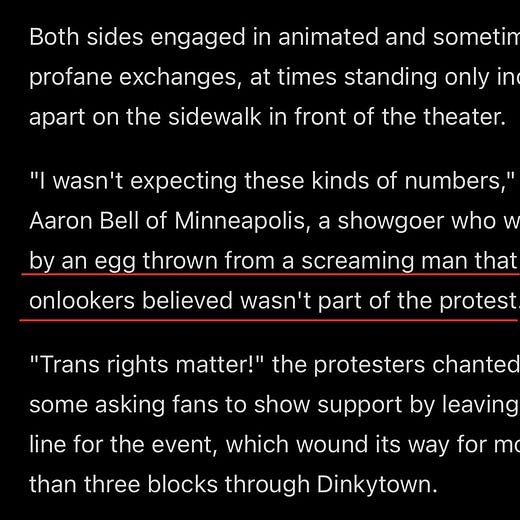E-Pluribus | July 22, 2022
Another internal conflict within a progressive organization, med students get a new DEI curriculum, and why democracy can't be "fixed" like a machine.
NOTE: The E-Pluribus newsletter will be taking a brief hiatus next week and will resume on Monday, August 1, 2022.
A round-up of the latest and best writing and musings on the rise of illiberalism in the public discourse:
Aaron Sibarium: Inside the Woke Meltdown at One Domestic Violence Organization
A recent piece from Ryan Grim at The Intercept chronicles staff meltdowns and internal conflicts within progressive advocacy groups. At the Washington Free Beacon, Aaron Sibarium brings tells the story of Women Against Abuse where tensions around racial equity have led to bizarre recommendations for abuse victims and an EEOC discrimination complaint against the organization, among other things.
By November 2020, the organization, which is ostensibly devoted to "serving all survivors," was offering to pay "BIPOC" employees more than their white counterparts and discouraging black abuse victims from calling the police. Its employees were also at war with each other, bickering over whether Jews are a persecuted minority group and whether there is such a thing as a non-racist white person.
Those events prompted Nicole Levitt, an attorney with the group’s legal center, to file a discrimination complaint against her employer with the Equal Employment Opportunity Commission alleging that it "berated, humiliated, and subjected" her to "mandatory thought reform efforts."
"Women Against Abuse used to be liberal," Levitt told the Washington Free Beacon. "Now it’s illiberal."
This story is based on Levitt’s discrimination complaint, Women Against Abuse’s response to it, and materials from the equity audit that Levitt shared with the Free Beacon. It reveals how the leading domestic violence nonprofit in Philadelphia descended into dogmatism and infighting, obsessing over identity as domestic homicides in the city reached an all-time high of 43 in 2021—more than double the previous year.
Read it all.
John D. Sailer: Association of American Medical Colleges Releases Official DEI Curriculum Standards
In a recent piece, Psychiatry Professor Sally Satel inquired “What is Happening to My Profession?” in which she explained how the Association of American Medical Colleges (AAMC) informed medical schools that they “must employ anti-racist and unconscious bias training and engage in interracial dialogues.” Now, as John D. Sailer from the National Association of Scholars reports, the AAMC has released new DEI Competency standards for graduating medical students that include requirements far beyond medical aptitude.
The Association of American Medical Colleges (AAMC) just released its official Diversity, Equity, and Inclusion (DEI) Competencies. Designed for curriculum development, the competencies function as DEI educational standards, providing a set of ideal “diversity” and “inclusion” skills for three stages of a physician’s education. For graduating medical students, the competencies include “describ[ing] the impact of various systems of oppression on health and health care (e.g., colonization, White supremacy, acculturation, assimilation).” For graduating residents, they include “promoting social justice and engag[ing] in efforts to eliminate health care disparities,” and for faculty physicians, “teach[ing] how systems of power, privilege, and oppression inform policies and practices and how to engage with systems to disrupt oppressive practices.”
Ultimately, these new competencies provide a blueprint for infusing the themes of identity politics—“intersectionality,” “white privilege,” “microaggression,” “allyship”—into medical education. In March, the National Association of Scholars acquired and published a draft version of the competencies. A number of critics spoke up, noting how the competencies would function as an obvious threat to academic freedom and, more broadly, sound medical education.
With the publication of these official competencies, the AAMC appears to be doubling-down. The official version includes only cosmetic changes to the draft. In their op-ed introducing the competencies, the president of the AAMC and the chair of the AAMC’s Council of Deans emphatically stated their support: “We believe this topic deserves just as much attention from learners and educators at every stage of their careers as the latest scientific breakthroughs”—a truly remarkable statement of priorities from the leaders of America’s foremost medical education association.
Read the full post.
Samuel Kimbriel: What the Democracy Engineering Complex Misses
Is democracy like an engine that just needs a tune up? At Wisdom of Crowds, political philosopher Samuel Kimbriel talks about the tendency of his colleagues who study democracy to recommend mechanical-sounding “fixes” to democracy’s problems. But this formulation, Kimbriel argues, ignores the human element of a system of SELF-government.
A lot has been said about the erosion of democracy at the popular level— a crisis showing up in temptations toward populist candidates or questioning election results. But this language—of mechanism, calibration, and control at the elite level—displays a different kind of crisis of democracy.
Our recent fixation with the mechanics of democracy is understandable. As internal tensions—around populism, Trump, January 6th—have grown, attention has naturally fallen on protecting democratic procedure. If there is a real possibility of a contested election in 2024 or 2028, for example, we need clear resources to respond.
But beneath these immediate needs is a broader narratival vacuum that has only been growing over the past decades around the idea of “democracy” itself. Most of the language we rely on to legitimate democracy is legacy language from the Cold War: freedom versus authoritarianism; self-governance versus communism; democracy versus autocracy. The earlier assumption was that once one side of the conflict disappeared, the other—democracy—would thrive on its own terms. What we have found instead is that it has become harder and harder to tell positive stories about democracy with any spirit. The language of mechanism and technique is the latest in a long series of attempts to fill this void.
[ . . . ]
In the end, we do actually have to decide whether we think that society is akin to a machine that should simply be managed through technocratic competency. In a world as complicated as ours, it’s not an implausible view, but we do have to be clear that it is also a decidedly undemocratic one.
Democracy is a more demanding, less neutral ideal than we often realize. To believe in democracy is to insist that above all else that the people should rule.
The essential feature of democracy is not, in other words, its structure—voting or the right to assemble or protections for protest—but its purpose. To locate sovereignty in the people is to embrace the idea that the full range of human aspiration should be able to shape public life in a non-trivial way. Those specific mechanisms—or any others we might dream up—find their value not as an end but as a means, in service to a specific confidence in human beings and their capacity to determine the purposes for life.
Read it all.
Around Twitter
More on the Chappelle show cancellation in Minneapolis:
Historical evidence for why you don’t want government dictating the truth:
Finally, Republicans and Democrats battle over Google search results for crisis pregnancy centers in the wake of the SCOTUS abortion ruling:













